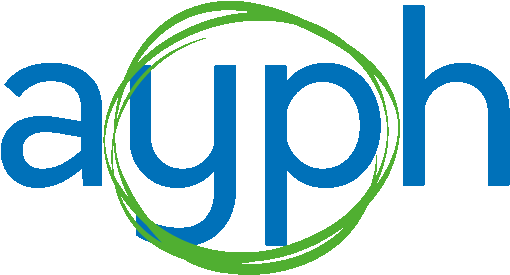AYPH’s Health Inequalities Programme
AYPH aims to shine a light on health inequalities experienced by young people, bringing together existing evidence and data, raising the profile of the issue and providing a channel for advocacy.
As part of our Health Inequalities programme, funded by the Health Foundation, the team regularly draws on the knowledge of experts in the field, aiming to align stakeholders behind common policy calls to improve health outcomes for all young people.
Other projects in the Health Foundation’s Future Health programme explore high quality work, types of work, economic insecurity, and transport options for young people.
For more information, contact us.
Care leavers experiences of health inequalities: evidence from data and youth engagement
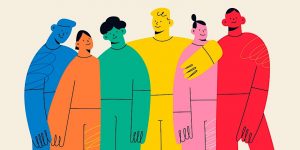 Care experienced young people are much more likely to experience poorer health, wellbeing, social and educational outcomes compared with the general population. As part of AYPH’s youth health inequalities programme we reviewed the available evidence and collaborated with young people to understand their perspectives. We worked in partnership with Coram Voice on the project, and we’re pleased to share our two reports, one on the data and evidence, and one on the youth engagement.
Care experienced young people are much more likely to experience poorer health, wellbeing, social and educational outcomes compared with the general population. As part of AYPH’s youth health inequalities programme we reviewed the available evidence and collaborated with young people to understand their perspectives. We worked in partnership with Coram Voice on the project, and we’re pleased to share our two reports, one on the data and evidence, and one on the youth engagement.
You can also watch our webinar on the topic and listen to a podcast developed by the youth panel and hear directly from young people sharing their experiences of the barriers they face in leading healthy lives and accessing healthcare services.
Health inequalities experienced by ethnic minority young people
 In order to better understand the health inequalities faced by young people from ethnic minority backgrounds we have carried out analysis of data and spoken directly with young people. In this briefing paper we have compiled 12 charts covering a range of publicly available data sources, which demonstrate the disparities faced by ethnic minority young people. Comparatively, there are particular concerns for Black and Traveller young people’s health outcomes. We worked in collaboration with the Race Equality Foundation to establish a youth panel to hear the in-depth views of a small group of young people from minority ethnic backgrounds. We discussed racism, micro-aggressions and the barriers they have experienced in accessing healthcare services – the findings are available in this briefing paper. You can read a summary of the work here.
In order to better understand the health inequalities faced by young people from ethnic minority backgrounds we have carried out analysis of data and spoken directly with young people. In this briefing paper we have compiled 12 charts covering a range of publicly available data sources, which demonstrate the disparities faced by ethnic minority young people. Comparatively, there are particular concerns for Black and Traveller young people’s health outcomes. We worked in collaboration with the Race Equality Foundation to establish a youth panel to hear the in-depth views of a small group of young people from minority ethnic backgrounds. We discussed racism, micro-aggressions and the barriers they have experienced in accessing healthcare services – the findings are available in this briefing paper. You can read a summary of the work here.
Compilation of data on young people’s health inequalities
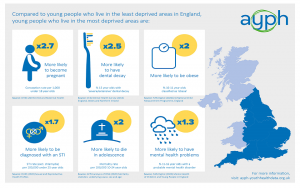 We’ve added 40+ charts onto our youth health data hub, which relate specifically to young people’s health inequalities. The data are divided into three sections: drivers of inequality, levers for action and health outcomes. This is the first time data on health inequalities of 10-25 year olds have been combined in one easily accessible place. The data show worrying trends and areas of concern, particularly relating to obesity, sexual health and oral health. You can read more about our analysis of the data in this blog post we published on the Health Foundation’s website.
We’ve added 40+ charts onto our youth health data hub, which relate specifically to young people’s health inequalities. The data are divided into three sections: drivers of inequality, levers for action and health outcomes. This is the first time data on health inequalities of 10-25 year olds have been combined in one easily accessible place. The data show worrying trends and areas of concern, particularly relating to obesity, sexual health and oral health. You can read more about our analysis of the data in this blog post we published on the Health Foundation’s website.
Position statement on young people’s health inequalities
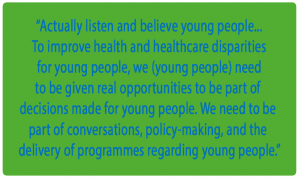 YPHP have developed a position statement on young people’s health inequalities. We believe that any efforts to reduce health inequalities must involve concerted efforts to prevent and reduce inequality in health outcomes and social determinants for young people aged 10-25. Our statement provides data on differences in health, direct experiences of young people from the NHS Youth Forum and examples of best practice from across our organisations.
YPHP have developed a position statement on young people’s health inequalities. We believe that any efforts to reduce health inequalities must involve concerted efforts to prevent and reduce inequality in health outcomes and social determinants for young people aged 10-25. Our statement provides data on differences in health, direct experiences of young people from the NHS Youth Forum and examples of best practice from across our organisations.
Guidance on how to talk about young people’s health inequalities
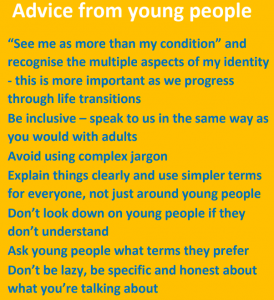 In 2021 we ran a survey with stakeholders to find out more about the language they use to describe health inequalities. We also spoke to young people about preferred communication and the language they’d like to see in practice. We found that professionals use terms such as “vulnerable” and “at risk”, but young people don’t often define themselves in these ways. You can read the findings in our report ‘Language matters: how to talk about health inequalities in the context of young people‘. We also produced a one page guidance poster to present the main findings and top tips from young people. You can read more about the work in two blog posts, one on the general report findings and the other looking specifically at the usefulness of protected characteristics and inclusion health groups as useful frameworks for identifying young people who are more likely to experience health inequalities.
In 2021 we ran a survey with stakeholders to find out more about the language they use to describe health inequalities. We also spoke to young people about preferred communication and the language they’d like to see in practice. We found that professionals use terms such as “vulnerable” and “at risk”, but young people don’t often define themselves in these ways. You can read the findings in our report ‘Language matters: how to talk about health inequalities in the context of young people‘. We also produced a one page guidance poster to present the main findings and top tips from young people. You can read more about the work in two blog posts, one on the general report findings and the other looking specifically at the usefulness of protected characteristics and inclusion health groups as useful frameworks for identifying young people who are more likely to experience health inequalities.
Clarifying what we mean by health inequalities for young people
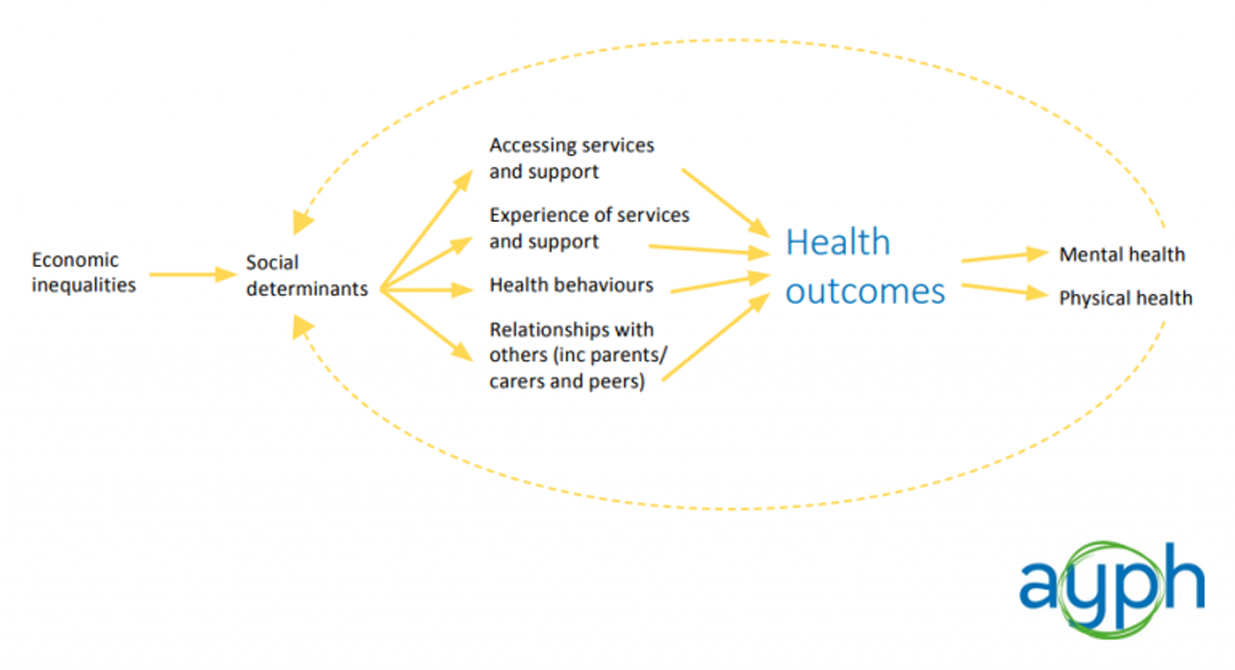
This briefing paper provides a definition for health inequalities that is specific to young people and a conceptual framework to help us identify causes and levers that influence health outcomes. We know that adolescence is a defining period for young people’s health, when inequalities between individuals and groups can become established and embedded, yet there is not enough focus within research, policy and practice on young people’s experiences of health inequalities. In highlighting the levers through which the “social determinants” of health are translated into divergent health outcomes, we hope to highlight opportunities for guidance and resources to improve young people’s health.
Inequalities in Health Alliance
We’ve joined 140 other organisations in becoming a member of the Inequalities in Health Alliance (IHA), convened by the Royal College of Physicians. The coalition is campaigning for an urgent reduction in health inequalities, calling for UK Government to:
- Develop a cross-government strategy to reduce health inequalities
- Commence the socio-economic duty, section 1 of the Equality Act 2010
- Adopt a ‘child health in all policies’ approach.
End Child Poverty Coalition
We’ve joined 80 other organisations in becoming a member of the End Child Poverty Coalition, made up of child welfare groups, social justice groups, faith groups, trade unions and others. All members share the objective of eradicating child poverty in the UK.
Advancing young people’s health
By becoming a member, you can join with others working in the field to learn, share knowledge and get support.
Advocating for young people’s health
If you would like to work with us to support young people’s health and ensure all young people achieve the best possible health outcomes, get in touch.

